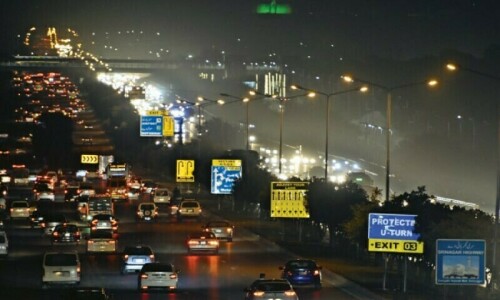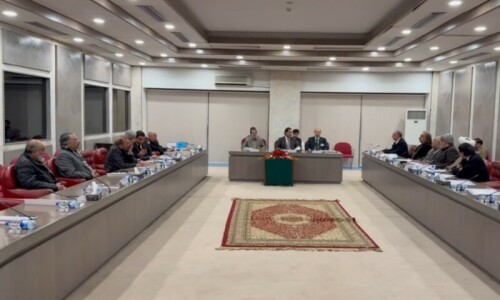ISLAMABAD: Consumption of tobacco in any form is injurious to health but the Ministry of National Health Services says it is a taxing issue too.
Dawn has learned that Minister of State of NHS Saira Afzal Tarar has written to the Federal Bureau of Revenue (FBR) that in order to curb the use of tobacco tax on cigarettes and other tobacco products should be increased in the Federal Budget 2015-16.
Her letter also suggested that 1 percent of the revenue the tobacco tax generates is earmarked for health sector, including tobacco control, health insurance and promoting healthy lifestyle.
And the FBR better start by withdrawing the tax exemption on the purchase of cigarettes the high offices of the president and governors of the country ironically enjoy – along with the powers to sign such curbs into law.
Last year, the tobacco industry contributed Rs130 billion in revenue to the national exchequer.
“If one per cent of the tobacco revenue is spent on the health sector it will resolve many health issues,” an official of the NHS ministry remarked to Dawn, requesting anonymity.
“No doubt these recommendations are in the best interest of the nation but we are not sure they would be adopted. Worldwide the tobacco lobby is very strong and influential,” he added.
“Isn’t it strange that the presidency, governors and Pakistan Navy get tax exemption on purchase of cigarettes?” he said.
In its letter to FBR, and other important federal offices, the NHS ministry has suggested a tax of Rs 31.2 on each packet of 20 cigarettes. The NHS proposals will also be presented in the pre-budget consultation meetings.
A research study on tobacco taxation in Pakistan, conducted jointly by FBR, World Bank, University of Toronto, Johns Hopkins University, University of Illinois at Chicago and the Beaconhouse National University, concluded that a uniform specific excise tax of Rs31.2 per pack of 20 cigarettes, could reduce overall cigarette consumption by 7.5 per cent, increase tax revenues by Rs 27.2 billion, leading to over half a million users quitting and reducing premature deaths among current adult smokers by over 180,000, while also preventing 725,000 youth from taking up smoking.
A technical working group on tobacco taxation was formed by the NHS ministry, with experts drawn from the FBR, The Union (Bloomberg Partner), World Health Organization, World Bank and Tobacco Control Cell.
In its meetings, the group reviewed the existing tobacco tax structure in Pakistan and examined the tobacco tax system to formulate its proposals.
Its letter reminds that under Article 6 of the Framework Convention on Tobacco Control, which Pakistan signed in 2004, Islamabad has to implement tax and price policies on tobacco products as a way to reduce tobacco consumption.
“Tobacco taxes that translate into price increases are considered the single most effective option for reducing tobacco use and increasing revenues. Higher tobacco taxes save money by reducing tobacco-related health care costs, including medication expenses,” the letter says.
It quotes a research that higher taxes are effective in reducing tobacco use among lower-income groups and in preventing young from taking up smoking.
According to the letter to the FBR, the NHS ministry has recommended that lower slab of all brands of cigarettes may be taxed at the rate of Rs31.2 per pack of 20 cigarettes and from Rs10.85 to Rs15.6 for pack of 10 cigarettes, with annual adjustment to tobacco tax rates introduced to minimize the impact of inflation and per capita income growth.
It has also recommended that the tax on other tobacco products mentioned in Schedule 1 of Federal Excise Act (i.e. un-manufactured tobacco, cigars, cheroots, cigarillos and cigarettes of tobacco substitutes) may be raised.
It seeks that products like Naswar, Gutka, Pan Masala, Mainpuri etc may also be brought into the tax net.
Executive Coordinator of the Network for Consumer Protection Nadeem Iqbal while talking to Dawn said that the recommendations should be implemented in letter and sprit.
“Tax is increased on cigarettes every year but tobacco industry finds loopholes to avoid the tax. It is good decision that Rs31.2 tax should be charged on each packet of cigarette. However I am still not sure that those recommendations will be implemented,” he said.
Published in Dawn, May 19th, 2015
On a mobile phone? Get the Dawn Mobile App: Apple Store | Google Play














































